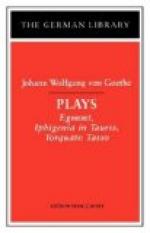Even then, when still young, we played at dice together, and the heaps of gold, one after the other, passed rapidly from his side to mine; he would look on with affected composure, while inwardly consumed with rage, more at my success than at his own loss. Well do I remember the fiery glance, the treacherous pallor that overspread his features when, at a public festival, we shot for a wager before assembled thousands. He challenged me, and both nations stood by; Spaniards and Netherlanders wagered on either side; I was the victor; his ball missed, mine hit the mark, and the air was rent by acclamations from my friends. His shot now hits me. Tell him that I know this, that I know him, that the world despises every trophy that a paltry spirit erects for itself by base and surreptitious arts. And thou !
If it be possible for a son to swerve from the manners of his father, practise shame betimes, while thou art compelled to feel shame for him whom thou wouldst fain revere with thy whole heart.
Ferdinand. I listen without interrupting thee! Thy reproaches fall like blows upon a helmet. I feel the shock, but I am armed. They strike, they wound me not; I am sensible only to the anguish that lacerates my heart. Alas! Alas! Have I lived to witness such a scene? Am I sent hither to behold a spectacle like this?
Egmont. Dost thou break out into lamentations? What moves, what agitates thee thus? Is it a late remorse at having lent thyself to this infamous conspiracy? Thou art so young, thy exterior is so prepossessing? Thy demeanour towards me was so friendly, so unreserved! So long as I beheld thee, I was reconciled with thy father; and crafty, ay, more crafty than he, thou hast lured me into the toils. Thou art the wretch! The monster! Who so confides in him, does so at his own peril; but who could apprehend danger in trusting thee? Go! Go! rob me not of the few moments that are left me! Go, that I may collect my thoughts, the world forget, and first of all thyself!
Ferdinand. What can I say? I stand and gaze on thee, yet see thee not; I am scarcely conscious of my own existence. Shall I seek to excuse myself? Shall I assure thee that it was not till the last moment that I was made aware of my father’s intentions? That I acted as a constrained, a passive instrument of his will? What signifies now the opinion thou mayst entertain of me? Thou art lost; and I, miserable wretch, stand here only to assure thee of it, only to lament thy doom.




